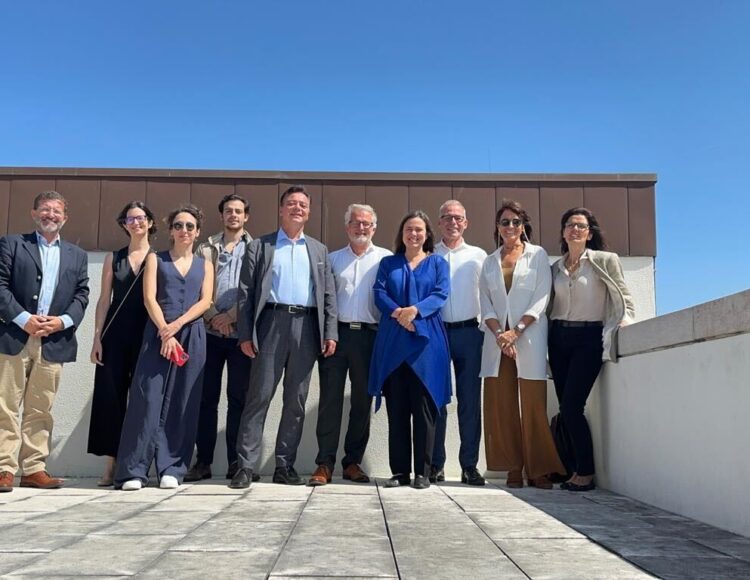On September 15, Housing Europe participated in a full-day exchange with the Municipality of Lisbon and its housing company Gebalis which is part of our member network. The purpose of this hands-on meeting was to share concrete ideas, questions and tips on whether and how the city can support initiatives from housing cooperatives and associations contributing to implementing its housing policy.
As Filipa Roseta –Councilwoman for Housing and Public Works- explained, increasing supply of housing for the City of Lisbon is a key priority: while the highest supply was in the 80s-90s, the last decade showed the lowest supply of housing. In particular, the shortage of affordable housing options needs to be tackled urgently.
Today there are significant opportunities in that there is very high public support for a public building, including from the Resilience Plan, additional government funding as well and resources from the municipal budget (twice as much as the city was investing in housing 10 years ago). Furthermore, another opportunity is offered by the fact the city still owns a lot of properties and land, which can be put into use leading to up to 9800 new homes.
While the city plans on building half of these units itself, to be then managed as affordable and social housing by Gebalis, the other half needs other actors to implement. In particular, while big plots are expected to attract private developers, small plots are going to be turned into coops – the idea is that they will provide cooperative ownership together with social projects for the area. However, over the past decade, many housing cooperatives ceased to exist, today only a few cooperatives are still active and not-for-profit housing associations do not exist in Lisbon. This is where examples from other countries can serve as inspiration.
Marta Sotto-Mayor – Municipal Director for Housing and Local Development in Portugal – reflected on the need to re-launch the cooperative movement. There are many challenges ranging from bureaucracy to costs and financing – however, the city is engaged in a dialogue with banks to make sure that people will be able to afford upfront investment. The overall cost of these new cooperative units which will be built on land leased by the municipality can be much lower than market prices, up to 50% less. The municipality hopes that young families can benefit.
Alice Pittini – Director of the Housing Europe Observatory – presented the state of the art of housing cooperatives in Europe showing common points as well as specificities of the different models (which range from rental to home ownership). Housing cooperatives can bring significant added value and they are responsive to the needs of their members and local communities, which shows in the many innovative projects in terms for instance of greener homes and neighbourhoods, providing cooperative housing adapted for seniors, etc. Also, we are witnessing a growing interest in this model across Europe with many new local, bottom-up experiences.
Bent Madsen – President of Housing Europe and Director of BL in Denmark – explained the nuts and bolts of not-for-profit housing in his country a model which has proved to be inclusive and sustainable over the years. This raised strong interest from Lisbon in the financing as well as the allocation policy, which includes the fact municipalities retain a share of the stock for their own waiting lists.
Özgür Öner – Director of the EU Representation at GdW, Germany – introduced key facts on housing in the country, notably the fact that the country has more people renting than owning their homes, which makes it a unique case in Europe. Housing cooperatives there have a long history starting in the 19th century, and some cooperatives (not all of them) are now very large organisations. According to him the added value of having big companies with 3-5.000 dwellings is the level of professionalism and experience.
Guido Schwarzendahl – President of Co-operative Housing International and Managing Director of Bauverein, Halle & Leuna (Germany) – presented the example of the cooperative he manages in Halle providing details on how it has managed to have almost no default by its tenants and well-functioning auditing system, resulting in very low risk and good financial rating. At the same time, he reflected on the fact that for a cooperative starting ‘from scratch’ today the initial investment required – and therefore the shares perspective members/residents will have to buy- can represent a significant financial burden. Besides providing land at a reduced cost, what the municipality could do to help in this sense is mobilize public and private resources to set up a guarantee fund.
After leaving the stunning venue of the Municipal Hall, the group headed off to Bairro Padre Cruz, which we were told is one of the largest social housing neighbourhood in the Iberic peninsula. The first stop was lunch a the restaurant “É Uma Mesa”, a very interesting initiative whereby homeless people are provided training in restaurant service and afterwards, they are supported in finding employment in the hospitality industry.
We then visited a municipal housing project in the neighbourhood, which includes new multifamily buildings as well as two-floor semi-detached homes. The new developments will accommodate both newcomers to the neighbourhood as well as families currently living in homes built during the dictatorship many of which are no longer fit for use. Filipa Roseta explained the process of consultation and co-decision with residents which the municipality carried out over more than one year and that significantly influenced the development plans.
As the last part of the day we visited another neighbourhood called Telheiras which was mainly developed by housing cooperatives. Compared to Bairro Padre Cruz this is a higher-income neighbourhood with very high-quality buildings and the presence of services and facilities, and it also includes social housing managed by the public housing company guaranteeing a social mix in the area.
